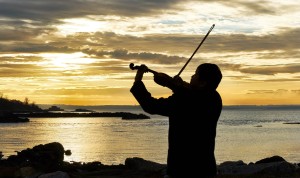James Wu

WSW: When did you start composing?
JW: The first piece I ever wrote, completed, and showed to other people was something my parents named “following the wind.” I personally didn’t have a title for it because, to this day, music is my language and so cannot be described with words (unless there is a text or program). Of course, I didn’t really start composing until I entered Mannes and went through their TOM classes. For the latter three of four years I was a violin major, I completed my first serious work, for string quartet in four movements. Then I become a composer by major and it went uphill from there.
WSW: What drew you to composing?
JW: Being raised in a constantly pessimistic and rigid environment, I developed a sense of not thinking outside the box, but rather examining it and scraping off various crumbs of microideas which I proceed to liberate from the box. Since composition is a craft where this is somewhat more tolerated than violin performance, I thought I would share my thoughts in that way. There is also the permanence of a composition where, unlike most other things in life, the notes do not wither away after a month or two, a year or two, or for people like Beethoven, a century or two. Yet, growing up surrounded by a blind drive for innovation regardless of basic emotional consequence, I felt that the fundamental elements of music – and of life – were being starkly overlooked. And in this way – the way of pursuing and maximizing that which humanity has been so used to being starved of that the mere presence of nourishment frightens them intensely or escapes their comprehension altogether – the making new of that which is not new but simply not noticed – so that I am neither here nor there… I express myself.
WSW: Do you play an instrument or sing?
JW: I play piano and violin, but the rigidity of the common performance aesthetic has rather discouraged me from performing in the recent past. However, the experiences I had in the Mannes Orchestra have helped me immensely in composing.
WSW: Where do you usually compose?
JW: At home on my computer. My best ideas are written half asleep as dawn approaches. Although I always think my very best ideas are written in the subway when I don’t have a way of writing them down, thus I am left only with the memory that they were in fact very good ideas.
WSW: What has been your biggest challenge in composing?
JW: Like Beethoven or Schonberg or Babbitt – or like most composers living in the postmodernity of their own age – who wished to communicate a message all their own but were inevitably faced with the side effect of only themselves being able to truly comprehend their own minds (or perhaps not even), I find myself torn between the new and the old… The old ways of speaking the musical language in highly unique and sophisticated methods, and the new ways of speaking so that anyone can understand – and remember that which was said.
WSW: Tell us a little about your woodwind quintet.
JW: My woodwind quintet was started as an assignment, actually, as I am less inclined to write for winds due to their limited range not just in pitches, but the fact that any extremities in redundancy, given the breathing nature of the performers behind these instruments, is much more exhausting. Like Beethoven, the limits I love to stretch are range, dynamics, and sustain. Nevertheless, the composition evolved on its own like any other of my writings.
For the first movement, the key is particularly evasive as it plays around at the very ends of the circle of fifths. Is it C# major or Db? Each harmonic progression after each repetition of the theme can only lie in either or, but not both.
The second movement is something that most composers write for the second movement of a wind quintet, and so it makes me old and noncontemporaneous. It is a scherz0. The 0 was a typo which I decided to keep for effect. The ranges are hyperextended and register travels as vastly as it can, often before it can really be noticed. I don’t know if it will sound good or not, but that is what being a composer is all about, right? Learning what a composition actually sounds like.





